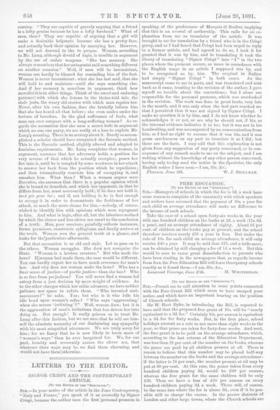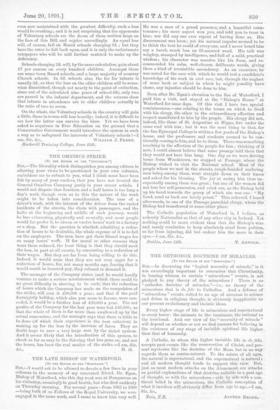[To THE ED/TOR OF THE " SPECTATOR ,": . 1
Sin,—Permit me to call attention to some points connected with the Free Grant Bill which seem to have escaped. your notice, and which have an important bearing on the position of Church schools.
Sir W. Hart Dyke, in introducing the Bill, is reported to have said that the proposed free grant of 10s, will be "nearly equivalent to a 3d. fee." Certainly 10s. per annum is equivalent to a 3d. fee for forty weeks. But, in the first place, school holidays amount as a rule to not more than eight weeks in the year, se that pence are taken for forty-four weeks. And next,. the free grant is to be paid. on the average attendance, which, according to the last returns of the Education Department, was less than 73 per cent. of the number on the books, whereas the pence are paid by all ,children present at all, There is reason to believe that this number may be placed. half-way between the number on the books and the average attendance: if the latter is 78 per cent., the number present at all may be put at 89 per cent. At this rate, the pence taken from every hundred children paying 3d, would be e49 per annum, whereas the free grant for the same children will be only 239. Thus we have a loss of 210 per annum on every hundred children paying 3d. a week. There will, of course, be the same loss where the fee is above 3a., even if it be pos- sible still to charge the excess. In the poorer districts of London and other large towns, where the Church schools are
even now maintained with the greatest difficulty, such a loss -would be crushing; and it is not surprising that the opponents of Voluntary schools see the doom of them written large on the face of this Bill, and rejoice accordingly. An equal loss will, of course, fall on Board schools charging 3d. ; but they have the rates to fall back upon, and it is only the unfortunate ratepayers who will be still further mulcted to make up the deficiency.
Schools charging a will, by the same calculation, gain about 27 per annum on every hundred children. Amongst these are some town Board schools, and a large majority of country 'Church schools. In 3d. schools also, the fee for infants is usually 2d., so that the loss on the older children will be some- what diminished, though not nearly to the point of extinction, since out of the calculated nine years of school-life, only two are passed in the infants' department, and the returns show that infants in attendance are to older children actually in the ratio of two to seven.
On the whole, the Voluntary schools in the country will gain a little, those in towns will lose heavily; indeed, it is difficult to see how the latter can survive the blow. Yet we have been asked to acquiesce in Free Education on the ground that a Conservative Government would introduce the system in such .a way as to safeguard the interests of Voluntary schools !—I



































 Previous page
Previous page